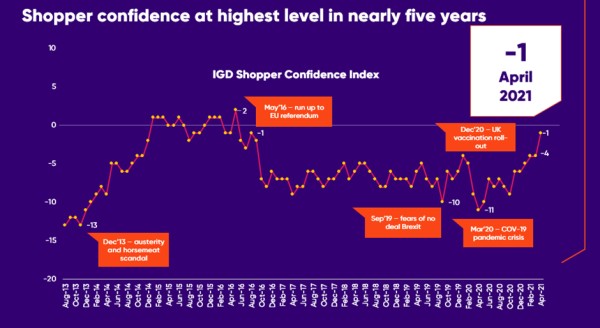The latest Shopper Confidence Index from IGD suggests shopper confidence has risen to its highest level in the last five years, driven by the easing of lockdown restrictions, a sharp decline in Covid-19 cases, and the rapid rollout of the vaccination programme.
IGD’s ShopperVista research also reveals an increased focus on quality and ‘trading-up’ this month to its highest level ever recorded, driven by higher income households.
Despite the polarisation of shoppers driven by the K-shaped economic recovery, confidence has increased in most demographic groups, but particularly amongst younger shoppers. However, the gap between shoppers focusing on quality, rather than saving money, has widened further.
The April figures show shopper confidence increased to -1, the highest level recorded by IGD since August 2016. This compares to -11 this time last year, at the start of the pandemic. Towards the end of the month, shopper confidence increased to +1, following the further easing of lockdown restrictions, which included non-essential retail.

Other insights from the research include people being more confident about their finances. Just 23% expect to be worse off in the year ahead (the lowest level recorded), with 22% expecting to be better off.
Shopper confidence increased the most among 18-24s, women and those living in Scotland and London.
Meanwhile, shoppers were found to be more optimistic about food prices. 74% expect food prices to get more expensive in the year ahead, the lowest level since April 2018.
Simon Wainwright, Director of Global Insight at IGD, commented: “Along with the more upbeat forecasts from the Bank of England, which will see the UK enjoy its fastest growth in more than 70 years, the latest shopper confidence score is really reassuring. Shoppers appear to be approaching the summer in a more positive mindset. This optimistic sentiment should provide plenty of opportunity for both retail and foodservice as restrictions begin to lift and shoppers are able to socialise. Retailers should focus on capturing the additional spend that higher income shoppers are diverting to ‘trading-up’.
“Many shoppers are choosing food for occasions that requires minimal preparation, enabling them to maximise the social time that they’ve missed out on. Ready-to-eat snacks, meal deals and meal kits are likely to be a popular choice among more shoppers this summer. Our latest shopper trends research reveals that the majority of existing users of meal concepts will continue to use them within their meal repertories, with 83% saying they will continue using meal deals from retailers.
“It’s important to remember that despite the optimism, confidence is still fragile; shoppers are very aware of the unstable situation, particularly among lower income households whose income and employment prospects have been negatively impacted by the pandemic.”
NAM Implications:
- How about conducting a series of what-ifs…
- …using these indicators as they could impact your categories…
- …and explore the implications?




